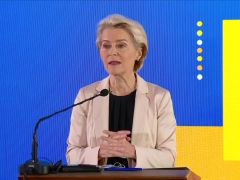The government of Republika Srpska delivered its 14th report to the United Nations Security Council today. The report advises the Council on the entity’s positions on a range of issues relevant to the international community’s involvement in BiH, and summarizes the progress the RS has made in several areas. The executive summary of the report is below.
Introduction and Executive Summary
In December, Republika Srpska will celebrate the 20th anniversary of the Dayton Peace Accords (the Accords). The Accords brought an end to the terrible civil war in Bosnia and Herzegovina (BiH); however, those involved in witnessing and joining the Accords as parties intended and produced an agreement more significant and comprehensive than a means for ending military hostilities. The Accords provided a long-term structure for a sustainable political system in BiH. Unfortunately, for reasons discussed in this report, full implementation of the Accords has been blocked, creating serious barriers to democratic and efficient government based upon the rule of law. In particular, the political structure carefully established under Annex 4 of the Accords, which sets forth BiH’s Constitution, has been under attack in an unlawful effort to change the mandated structure in dangerous ways. The future of BiH depends upon changing course in order to restore what was so wisely constructed.
I. The Nature of the Dayton System
The Dayton Accords reflected a realistic understanding of what was necessary to bring lasting stability to Bosnia and Herzegovina. The BiH structure provided for in the Dayton Constitution built on earlier proposals, which were all based on some form of decentralized, consociational structure to form a functioning union of three peoples with great distrust for each other, based upon their historical experiences. The BiH Constitution created a consociational system that left the Entities broad autonomy, strictly limited the competencies
of BiH-level institutions, and provided protections for each of BiH’s Constituent Peoples. The Constitution fully satisfied none of the formerly warring parties. But the authors of the Dayton Constitution knew such a system with its features was the only way to create a sustainable form of governance for BiH.
II. The Failure to Implement the Dayton System
Unfortunately, the constitutional system so carefully devised in the Dayton Accords has often been flouted. BiH’s Bosniak parties have been unwilling to accept BiH’s consociational structure. By carefully limiting the competencies of BiH institutions, the BiH Constitution
promotes functionality by minimizing the number of decisions required at the BiH level. But the High Representative’s forced centralization of competencies at the BiH level sabotaged the Dayton design. By requiring decisions to be made at the most contentious possible level,
centralization has maximized BiH’s discord and dysfunction.
The High Representative achieved this destructive centralization by asserting and exercising a wholly fabricated set of powers to impose laws and constitutional amendments and punish individuals by decree. As former UK Ambassador Charles Crawford, who helped invent these so-called “Bonn Powers” has admitted, “the Bonn Powers had no real legal basis at all.” The illegal centralization of BiH has turned the BiH level into what the International Crisis Group calls “a zombie administration, providing full employment to civil servants but few services to citizens.” In addition to creating a bloated and dysfunctional level of governance, centralization has undermined the rule of law and deteriorated safeguards for BiH’s Constituent Peoples.
III. Reforms Necessary to Implement the Dayton System
It is essential that BiH enact reforms to implement the political system so carefully laid out in the BiH Constitution. Perhaps the most important area in need of reform is the justice system imposed on BiH by the High Representative, which is deeply inconsistent with European standards. The RS is seeking judicial reforms through the EU’s Structured Dialogue on Justice, and EU experts agree with the RS on the necessity of reforms to laws such as the Law on Court of BiH. However, BiH judicial institutions have been fiercely resisting these
essential reforms. The RS is also promoting judicial reform through a referendum that will gauge citizens’ views about the laws imposed on them by the High Representative, including the laws that established the BiH Court and Prosecutor’s Office. These reforms have been
wrongfully challenged by the High Representative in a Special Report to the UN Secretary General. The RS sent a Response to the Special Report, which demonstrates why the High Representative exceeded his authority in his Special Report and why the RS’s referendum is
protected by the BiH Constitution and Dayton Accords as a legal means to promote important reforms. A copy of the Response is provided as Attachment 2 to this Report. A copy of Annex 10 of the Dayton Accords, which created the High Representative and set forth his limited mandate, is provided as Attachment 1 herein.
The 20th anniversary of the Dayton Accords should be celebrated by everyone in BiH, but it is more important for all parties in BiH to commit to the Dayton Constitution’s full implementation. The Constitution’s consociational system must be restored. There is broad support in BiH for EU integration, and BiH’s decentralized structure is fully consistent with EU membership. The RS is doing everything in its power to move EU integration forward. But for BiH to qualify for EU membership, BiH must become self-governing, under the rule of law, with full sovereignty. This will require that the High Representative’s asserted right to rule by decree must come to a rapid and peaceful end. Moreover, after 20 years of peace in BiH, the UN Security Council should cease acting there under Chapter VII of the UN Charter.
The Dayton Constitution provides for a sustainable and functional political system in BiH. Twenty years after Dayton, it is past time for all parties in BiH—along with all within the international community—to support that system rather than undermine it.


